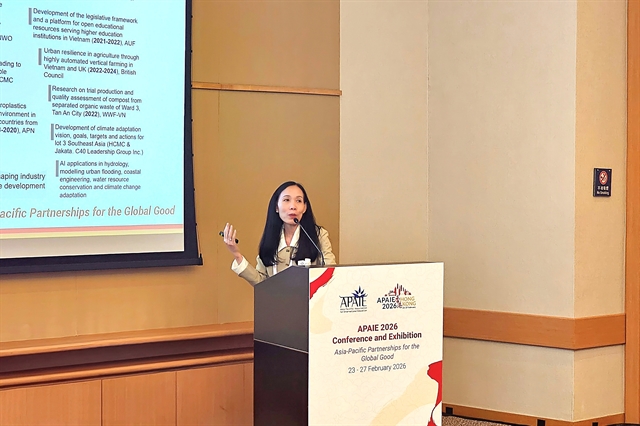 Society
Society

No mobile phone subscribers have been locked out of service yet, two days after a controversial new decree went into force that demands subscribers to submit real information – including portrait photos – to network carriers.
 |
| Customers waiting to get their personal information updated at a Viettel office in Hà Nội. — VNA/VNS Photo Lê Phú |
HÀ NỘI — No mobile phone subscribers have been locked out of service yet, two days after a controversial new decree went into force that demands subscribers to submit real information – including portrait photos – to network carriers.
The decree originally aimed to scrub spam content, which users frequently complain about.
Phạm Thị Liên, a user in Ba Đình District of Hà Nội, said she bought a SIM from the military-run operator Viettel a few years ago, and she received a text message from the operator asking her to submit necessary information.
“However, the registration office was so crowded that it never got to my turn. I can still make and receive calls as normal,” Liên said.
According to the Authority of Telecommunications under the Ministry of Information and Communication (MIC), one of the creators of the decree, April 24 is just the deadline for network carriers to have a complete database of its users’ information in line with the decree. After this deadline, the telecom authorities can arrive at anytime to inspect carriers’ compliance and those found to have insufficient information in their database will be fined.
Also according to the telecom authority, only subscribers that have received text messages from their carriers need to submit their information and portrait photos, or else they would face service suspension.
According to the decree, the network carrier would be required to block subscriber’s call-making capacity 15 days after the first notification is sent out, while two-direction block would take effect after the next 15 days if the subscriber still fails to submit their personal information to the carrier. After 60 days from the first notification, uncooperative subscribers would have their contracts terminated and SIM number recalled.
Most numbers that require information updates are prepaid users. Prior to 2017, Việt Nam had some 120 million phone subscribers, with 80 million being prepaid ones. Amongst these, only 25 per cent registered correctly while the remaining 75 per cent of the subscribers need to update their personal information.
According to telecom experts, in the early days of mobile service development, most telecom companies pulled out all the stops to attract subscribers, and avoided careful verification of registers’ information.
“Many SIM retailers ‘borrowed’ ID cards from other people to register and activate the SIM cards then sell them. That’s why there are currently so many phone numbers not registered under the names of the users,” Quang Thái, a network engineer, said.
This once rampant practice leaves the doors open to annoying spam messages and scam calls, a prime justification for the decree.
Notably, the decree has allowed carriers with a one-year window to ensure compliance, but still at the moment, network carriers report that they mostly ask new subscribers (since 2017, April 24) to provide full personal information while the verification of previous subscribers remains slow.
Subscribers who have registered their SIMs using their own ID cards would not be required to update their information since the photo on their ID is sufficient for identification purposes.
Only close to the April 24 mark, when the media started carrying notices about the deadline, did many people scramble to get to their carriers’ offices to provide lacking information.
The irresponsible manner of the carriers in notifying users has led to serious crowding at their own offices, causing great public irritation
Currently, the three biggest carriers in Việt Nam – Vinaphone, MobiFone, and Viettel – have allowed their users to register online. — VNS




